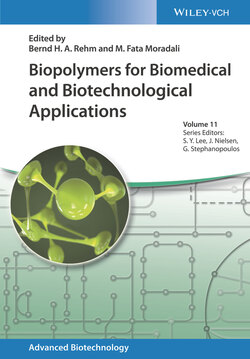Читать книгу Biopolymers for Biomedical and Biotechnological Applications - Группа авторов - Страница 49
2.7.2 Properties of Chitinous Polysaccharides
ОглавлениеChitin is a crystalline and hydrophobic polysaccharide with a molecular weight of 1 to 2 × 105 Da [226,227,231,232]. Chitinous polysaccharides, such as CGC, also have a similar molecular weight (4 to 5 × 105 Da), but since they are covalently linked to β‐glucans, they present an amorphous nature [222]. Chitin and chitinous polysaccharides are insoluble in water and in most of organic solvents. The most common solvent systems used for these biomaterials are N,N‐dimethylacetamide/LiCl, NaOH/urea, LiOH or NaOH at low temperatures, or, more recently, ionic liquids [227,231,233]. In opposition, chitosan is soluble in diluted organic acids such as acetic, formic, or hydrochloric acid solutions [227,231]. Chitosan is also characterized for its high deacetylation degree (DD), usually above 50% and a molecular weight of 2 × 104 to 2 × 105 Da [216,234].
Chitin, chitosan, and their complexes are also known by their biological activity. Behind being biodegradable and biocompatible, these polysaccharides also have antimicrobial, anti‐inflammatory, antioxidant, and antitumoral activity [235,237]. Moreover, fungal chitosan also has emulsifying properties with vegetable oils [214].
